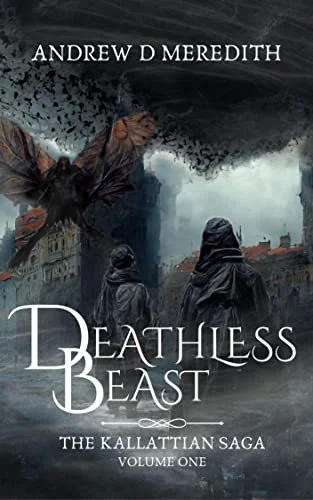Book Review: Deathless Beast by Andrew D Meredith
Deathless Beast is a slow burn fantasy story that is driven by its world-building first, and you’ll possess a special skill, that I regrettably lack, if you’re able to keep up with the bombardment of names and concepts without ever flipping back to the glossary.
I say this up front because for many people, any or all of those things will be a sign that this book isn’t for them, and I will freely admit that Deathless Beast exists within its own niche. If you’re anything like me however, then this book will be one of the best fantasy books you’ve ever read.
I love the concept of paladins, but for the longest time the only stories available to me have depicted them in only the narrowest of ways. They might be honourable knights in gleaming armour, they might take a heroic oath or wield divine magic, but fundamentally they’re rarely seen as anything more than another kick-ass sword & shield archetype.
What I’ve always felt was lacking, and what Andrew D Meredith has given me with this book, is the importance of faith and structured religion to the concept. Meredith’s paladins and paladames are so fully realized in Deathless Beast that I’m able to lose myself in their doctrine, their bureaucracy, their endless debate and interpretation of scripture, and the human mundanity to it all. They still retain that core essence of holy knights blending duty and magic together, but the world-building on display elevates them further, giving them a sense of realness and order, creating definition that no other portrayal has managed to attain. And in case you start to think that I only appreciated Deathless Beast for its paladins, allow me to correct that mistaken assumption. There was simply no such thing as a boring chapter in this book, and I credit that to Meredith’s ability to write compelling character focused dialogue.
I mentioned before that this is a world-building first experience, much in the same way that the Malazan series is; but whereas I bounced hard off of that series for what I described as an inability to write clear and believable characters, Deathless Beast manages to balance its vast mystic world, and the machinations of the wider story, against point of view characters that fundamentally feel real. So often in the conversations we have about books do these separate functions seem at opposition with one another, and it’s books like this that remind me that we can just have both, and it’s beautiful. Furthermore, I appreciated how hopeful and emotionally sensitive this story was.
You have women supporting women, for the sake of doing the right thing and acting in solidarity, which felt refreshing for how shockingly rare that can be to find in the genre. Yet you also have damaged men sharing tearful hugs, mending their old wounds through compassion, forgiveness and understanding, reinforcing a side to masculinity that is openly aspirational. And I have so many good examples to give in this vein, as Meredith constantly reminded me of how the greatest in humanity can be brought out in the darkest of places. I must still talk about flaws, as no work exists without them. And in this case it has to be the prose. While there are examples of poeticism (even outright poetry in the case of the exerts presented at the start of each chapter), one complaint that regularly came to my mind while reading was how the dialogue would be unsupported by any description or kineticsm.
There’s an abundance of “he said”, “she asked”, “they nodded”, and after a while I itched for something more flowery to inspire my imagination. To be clear, the book doesn’t lack that in its entirety, but there absolutely was sections of dialogue that never stopped to tell me what the characters were doing, or how they were expressing their emotions. It had the unfortunate consequence of seeming point to point, almost like it was in a rush to get somewhere, when I would have been perfectly happy lingering in the moment a while. I suspect for some, that last point might be a considerable barrier to their engagement, but for me, any negative to be found here was overwhelmingly washed away by the sheer joy I experienced while reading this story. It’s original and thoughtful, with an innate humanity that many of its contemporaries strive towards, yet fail to fully capture. I was left with an overpowering desire to learn more about the world, to share more experiences with the characters, and to see more horizons in the world of Kallattia.
So getting past my relentless gushing, I adored this book, and at risk of speaking prematurely, I consider it to be one of the best – if not the best – fantasy book I’ve ever had the pleasure of reading.


